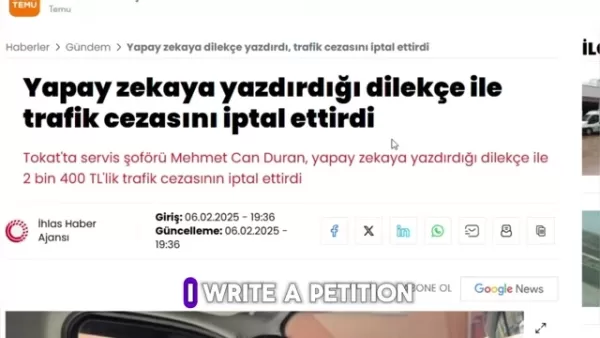AI Poses Existential Threat to Humanity in Evolving Intelligence Landscape
The Transformative Power of AI: Opportunities and Challenges
Artificial Intelligence (AI) is reshaping the world at an unprecedented pace, bringing both extraordinary possibilities and profound concerns. From automating mundane tasks to potentially outpacing human cognition, AI's influence is undeniable. This article explores the critical aspects of this technological shift, focusing on how we can embrace AI while preserving what makes us uniquely human.
AI's Impact Across Industries
AI is revolutionizing sectors ranging from healthcare to finance, offering the potential to streamline operations and improve efficiency. However, this progress comes with a cost—many jobs are at risk of automation. Fields traditionally seen as secure, like law and medicine, are not immune. For instance:
- Drivers may face competition from self-driving vehicles, leaving truckers and taxi drivers searching for new roles.
- Cashiers could be replaced by automated checkout systems, altering the retail landscape.
- Lawyers might rely on AI for research and document analysis, reshaping legal practices.
- Doctors could benefit from diagnostic tools that outperform human judgment in analyzing medical data.
Even creative professionals, such as graphic designers and copywriters, may encounter competition from AI-driven solutions. This widespread automation presents significant challenges for workers and economies alike.
The Silent Erosion of Humanity
While AI's potential to enhance productivity is undeniable, its broader impact on humanity cannot be overlooked. It's not just about replacing jobs—it's about subtly changing how we think and interact. Over-reliance on AI could dull our critical thinking and creativity, turning us into passive consumers of machine-generated insights. Instead of fostering innovation, we might settle for the convenience of pre-packaged answers.
This gradual shift is perhaps the greatest threat of AI—not a sudden takeover, but an insidious dilution of our core abilities. To counteract this, we must strike a balance, leveraging AI as a tool while nurturing our innate talents. After all, the essence of being human lies in our capacity for original thought, empathy, and collaboration.
A Historical Echo
These concerns are not new. Decades ago, an article titled 'The Menace of the Micro' sounded similar alarms. Published in 1997 by Middle East Technical University, it warned of technology's disruptive potential. It's striking how relevant this piece remains today, highlighting the enduring nature of these debates. By reflecting on past warnings, we can better anticipate future pitfalls and ensure that AI serves humanity, not the other way around.
Strategies for Thriving in the AI Era
Embracing the AI revolution requires proactive measures. Lifelong learning is no longer optional—it's essential for survival in a rapidly changing world. Here's how you can stay ahead:
- Develop Complementary Skills: Focus on traits AI struggles to replicate, such as emotional intelligence, creativity, and problem-solving. Platforms like Coursera and Udemy offer countless resources to help you upskill.
- Foster Human Connections: As AI handles routine tasks, prioritize building meaningful relationships. Join clubs, volunteer, or explore creative hobbies to nurture your interpersonal skills.
- Advocate for Ethical AI: Support policies promoting fairness, transparency, and accountability. Engage in discussions, educate others, and contribute to initiatives championing responsible AI development.
Addressing Economic Disparities
One of the most pressing issues tied to AI is the widening gap between the wealthy and the working class. Companies harnessing AI stand to amass vast fortunes, while displaced workers struggle to adapt. To mitigate this divide, societies must invest in accessible retraining programs, implement fair labor practices, and explore concepts like universal basic income. Only then can we ensure AI benefits everyone, not just a privileged few.
Balancing Benefits and Risks
Like any powerful tool, AI carries dual consequences. Its advantages include enhanced efficiency, personalized experiences, and accelerated research. Yet, it also poses risks such as job loss, algorithmic bias, and ethical quandaries. As we move forward, it's vital to weigh these pros and cons carefully and strive for a future where AI complements rather than undermines humanity.
Frequently Asked Questions
- Which jobs are least likely to be replaced by AI? Jobs demanding creativity, emotional intelligence, and complex problem-solving, such as therapy or education, are less vulnerable to automation.
- How can I prepare for the future of work? Focus on developing soft skills, stay informed about technological trends, and support ethical AI initiatives.
- What ethical considerations should guide AI development? Ensure fairness, transparency, and accountability in AI systems, addressing issues like bias and privacy.
Looking Ahead
As AI continues to evolve, its impact will only deepen. By staying informed, advocating for ethical practices, and fostering human connection, we can navigate this transformative era successfully. The key lies in remembering that technology is a means to an end—not the end itself.


 Related article
Related article
 Trump Exempts Smartphones, Computers, and Chips from Tariff Hikes
The Trump administration has granted exclusions for smartphones, computers, and various electronic devices from recent tariff increases, even when imported from China, according to Bloomberg reporting. However, these products remain subject to earlie
Trump Exempts Smartphones, Computers, and Chips from Tariff Hikes
The Trump administration has granted exclusions for smartphones, computers, and various electronic devices from recent tariff increases, even when imported from China, according to Bloomberg reporting. However, these products remain subject to earlie
 AI Reimagines Michael Jackson in the Metaverse with Stunning Digital Transformations
Artificial intelligence is fundamentally reshaping our understanding of creativity, entertainment, and cultural legacy. This exploration into AI-generated interpretations of Michael Jackson reveals how cutting-edge technology can breathe new life int
AI Reimagines Michael Jackson in the Metaverse with Stunning Digital Transformations
Artificial intelligence is fundamentally reshaping our understanding of creativity, entertainment, and cultural legacy. This exploration into AI-generated interpretations of Michael Jackson reveals how cutting-edge technology can breathe new life int
 Does Training Mitigate AI-Induced Cognitive Offloading Effects?
A recent investigative piece on Unite.ai titled 'ChatGPT Might Be Draining Your Brain: Cognitive Debt in the AI Era' shed light on concerning research from MIT. Journalist Alex McFarland detailed compelling evidence of how excessive AI dependency can
Comments (4)
0/200
Does Training Mitigate AI-Induced Cognitive Offloading Effects?
A recent investigative piece on Unite.ai titled 'ChatGPT Might Be Draining Your Brain: Cognitive Debt in the AI Era' shed light on concerning research from MIT. Journalist Alex McFarland detailed compelling evidence of how excessive AI dependency can
Comments (4)
0/200
![HarryPerez]() HarryPerez
HarryPerez
 August 29, 2025 at 2:30:34 PM EDT
August 29, 2025 at 2:30:34 PM EDT
Читал статью об ИИ как экзистенциальной угрозе — интересно, как быстро мы перейдём от 'ох, какие умные алгоритмы!' к 'ой, а они нас не уничтожат?' Пока что мой робот-пылесос даже углы плохо убирает, так что не паникуем раньше времени 😅


 0
0
![AlbertHernández]() AlbertHernández
AlbertHernández
 August 20, 2025 at 11:01:16 AM EDT
August 20, 2025 at 11:01:16 AM EDT
AI's potential is mind-blowing, but the idea of it outsmarting us feels like a sci-fi movie gone wrong. 😬 Are we ready for this?


 0
0
![KeithMoore]() KeithMoore
KeithMoore
 August 17, 2025 at 5:01:00 PM EDT
August 17, 2025 at 5:01:00 PM EDT
AI's potential is wild, but the idea of it outsmarting us freaks me out a bit 😅. Still, automating boring tasks? Sign me up!


 0
0
![JoseJackson]() JoseJackson
JoseJackson
 August 4, 2025 at 6:01:00 AM EDT
August 4, 2025 at 6:01:00 AM EDT
AI's potential is mind-blowing, but the idea of it outsmarting us gives me chills! 😨 How do we balance innovation with safety?


 0
0
The Transformative Power of AI: Opportunities and Challenges
Artificial Intelligence (AI) is reshaping the world at an unprecedented pace, bringing both extraordinary possibilities and profound concerns. From automating mundane tasks to potentially outpacing human cognition, AI's influence is undeniable. This article explores the critical aspects of this technological shift, focusing on how we can embrace AI while preserving what makes us uniquely human.
AI's Impact Across Industries
AI is revolutionizing sectors ranging from healthcare to finance, offering the potential to streamline operations and improve efficiency. However, this progress comes with a cost—many jobs are at risk of automation. Fields traditionally seen as secure, like law and medicine, are not immune. For instance:
- Drivers may face competition from self-driving vehicles, leaving truckers and taxi drivers searching for new roles.
- Cashiers could be replaced by automated checkout systems, altering the retail landscape.
- Lawyers might rely on AI for research and document analysis, reshaping legal practices.
- Doctors could benefit from diagnostic tools that outperform human judgment in analyzing medical data.
Even creative professionals, such as graphic designers and copywriters, may encounter competition from AI-driven solutions. This widespread automation presents significant challenges for workers and economies alike.
The Silent Erosion of Humanity
While AI's potential to enhance productivity is undeniable, its broader impact on humanity cannot be overlooked. It's not just about replacing jobs—it's about subtly changing how we think and interact. Over-reliance on AI could dull our critical thinking and creativity, turning us into passive consumers of machine-generated insights. Instead of fostering innovation, we might settle for the convenience of pre-packaged answers.
This gradual shift is perhaps the greatest threat of AI—not a sudden takeover, but an insidious dilution of our core abilities. To counteract this, we must strike a balance, leveraging AI as a tool while nurturing our innate talents. After all, the essence of being human lies in our capacity for original thought, empathy, and collaboration.
A Historical Echo
These concerns are not new. Decades ago, an article titled 'The Menace of the Micro' sounded similar alarms. Published in 1997 by Middle East Technical University, it warned of technology's disruptive potential. It's striking how relevant this piece remains today, highlighting the enduring nature of these debates. By reflecting on past warnings, we can better anticipate future pitfalls and ensure that AI serves humanity, not the other way around.
Strategies for Thriving in the AI Era
Embracing the AI revolution requires proactive measures. Lifelong learning is no longer optional—it's essential for survival in a rapidly changing world. Here's how you can stay ahead:
- Develop Complementary Skills: Focus on traits AI struggles to replicate, such as emotional intelligence, creativity, and problem-solving. Platforms like Coursera and Udemy offer countless resources to help you upskill.
- Foster Human Connections: As AI handles routine tasks, prioritize building meaningful relationships. Join clubs, volunteer, or explore creative hobbies to nurture your interpersonal skills.
- Advocate for Ethical AI: Support policies promoting fairness, transparency, and accountability. Engage in discussions, educate others, and contribute to initiatives championing responsible AI development.
Addressing Economic Disparities
One of the most pressing issues tied to AI is the widening gap between the wealthy and the working class. Companies harnessing AI stand to amass vast fortunes, while displaced workers struggle to adapt. To mitigate this divide, societies must invest in accessible retraining programs, implement fair labor practices, and explore concepts like universal basic income. Only then can we ensure AI benefits everyone, not just a privileged few.
Balancing Benefits and Risks
Like any powerful tool, AI carries dual consequences. Its advantages include enhanced efficiency, personalized experiences, and accelerated research. Yet, it also poses risks such as job loss, algorithmic bias, and ethical quandaries. As we move forward, it's vital to weigh these pros and cons carefully and strive for a future where AI complements rather than undermines humanity.
Frequently Asked Questions
- Which jobs are least likely to be replaced by AI? Jobs demanding creativity, emotional intelligence, and complex problem-solving, such as therapy or education, are less vulnerable to automation.
- How can I prepare for the future of work? Focus on developing soft skills, stay informed about technological trends, and support ethical AI initiatives.
- What ethical considerations should guide AI development? Ensure fairness, transparency, and accountability in AI systems, addressing issues like bias and privacy.
Looking Ahead
As AI continues to evolve, its impact will only deepen. By staying informed, advocating for ethical practices, and fostering human connection, we can navigate this transformative era successfully. The key lies in remembering that technology is a means to an end—not the end itself.



 Trump Exempts Smartphones, Computers, and Chips from Tariff Hikes
The Trump administration has granted exclusions for smartphones, computers, and various electronic devices from recent tariff increases, even when imported from China, according to Bloomberg reporting. However, these products remain subject to earlie
Trump Exempts Smartphones, Computers, and Chips from Tariff Hikes
The Trump administration has granted exclusions for smartphones, computers, and various electronic devices from recent tariff increases, even when imported from China, according to Bloomberg reporting. However, these products remain subject to earlie
 AI Reimagines Michael Jackson in the Metaverse with Stunning Digital Transformations
Artificial intelligence is fundamentally reshaping our understanding of creativity, entertainment, and cultural legacy. This exploration into AI-generated interpretations of Michael Jackson reveals how cutting-edge technology can breathe new life int
AI Reimagines Michael Jackson in the Metaverse with Stunning Digital Transformations
Artificial intelligence is fundamentally reshaping our understanding of creativity, entertainment, and cultural legacy. This exploration into AI-generated interpretations of Michael Jackson reveals how cutting-edge technology can breathe new life int
 Does Training Mitigate AI-Induced Cognitive Offloading Effects?
A recent investigative piece on Unite.ai titled 'ChatGPT Might Be Draining Your Brain: Cognitive Debt in the AI Era' shed light on concerning research from MIT. Journalist Alex McFarland detailed compelling evidence of how excessive AI dependency can
Does Training Mitigate AI-Induced Cognitive Offloading Effects?
A recent investigative piece on Unite.ai titled 'ChatGPT Might Be Draining Your Brain: Cognitive Debt in the AI Era' shed light on concerning research from MIT. Journalist Alex McFarland detailed compelling evidence of how excessive AI dependency can
 August 29, 2025 at 2:30:34 PM EDT
August 29, 2025 at 2:30:34 PM EDT
Читал статью об ИИ как экзистенциальной угрозе — интересно, как быстро мы перейдём от 'ох, какие умные алгоритмы!' к 'ой, а они нас не уничтожат?' Пока что мой робот-пылесос даже углы плохо убирает, так что не паникуем раньше времени 😅


 0
0
 August 20, 2025 at 11:01:16 AM EDT
August 20, 2025 at 11:01:16 AM EDT
AI's potential is mind-blowing, but the idea of it outsmarting us feels like a sci-fi movie gone wrong. 😬 Are we ready for this?


 0
0
 August 17, 2025 at 5:01:00 PM EDT
August 17, 2025 at 5:01:00 PM EDT
AI's potential is wild, but the idea of it outsmarting us freaks me out a bit 😅. Still, automating boring tasks? Sign me up!


 0
0
 August 4, 2025 at 6:01:00 AM EDT
August 4, 2025 at 6:01:00 AM EDT
AI's potential is mind-blowing, but the idea of it outsmarting us gives me chills! 😨 How do we balance innovation with safety?


 0
0





























